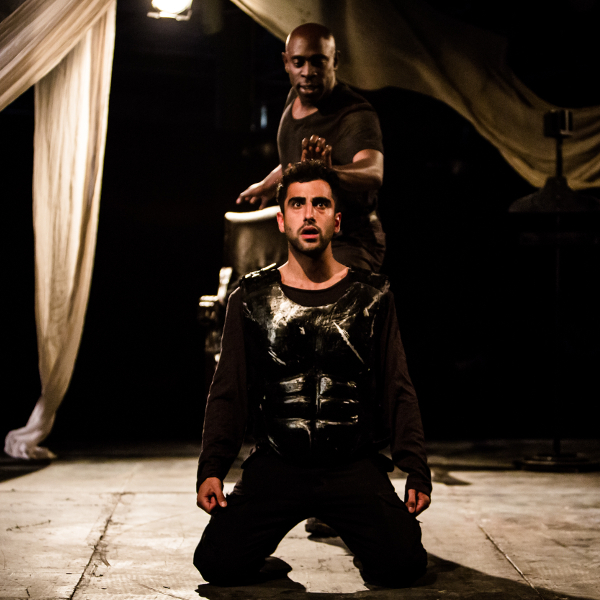This Flesh is Mine (Testbed1)

© Richard Davenport
A confused Achilles asks Priam "Where are we? What is this time?" and at this point, This Flesh is Mine begins to draw interesting comparisons between ancient and contemporary conflicts. While these poignant moments are somewhat lost amongst the original tale of Homer's The Iliad, the piece performed by Palestinian company ASHTAR and Border Crossings shows promise.
For the first act you could be forgiven for thinking this was a faithful adaptation of The Iliad. Achilles (Andrew French) refuses to fight the Trojans when King Agamemnon (David Broughton-Davies) takes his slave-prize Briseis (Jumaan Short). Achilles is finally convinced to re-join the conflict after the death of his friend Patroclus (Tariq Jordan). Meanwhile, Priam King of Troy (Gerrard McArthur) tries to navigate the demands of his arrogant son Hector (Jordan), his furious wife Hecuba (Iman Aoun) and the people of Troy. In the final third of the play this flips to a modern setting, with the final conflict played out through bombs and gunshots with comparisons to conflicts in Iraq and Afghanistan.
It is a promenade piece within the interesting space at testbed1, and it encourages a sense of exploration in the audience alongside that unfortunate tendency for people to angrily push each other aside to get closer to the action. It’s a distraction that could be solved by a more directed and considered rotation of set pieces rather than the seemingly arbitrary movement around the space.
The cast (shorn of two of their main actors who shockingly were refused visas to perform) commit to this re-telling and make sure these distractions are minimal. French’s Achilles is thundering and impressive while Jordan gives a compelling Hector and Patroclus. The action set in the ancient period is often too bombastic in its portrayal however and seems more inspired by the film version Troy‘s chest-beating, action hero bravado. Unfortunately it therefore suffers a similar loss of the intricacy and poetry of Homer’s original and the conflict does not become much more than a tense war story.
With most of the play set in the former time period it dwells too long in the trappings of Homer’s ancient day. Instead of a gradual transformation to a modern theatre of war the piece makes a single leap at the beginning of the second act. If the action proceeding is an attempt to prime the audience for this transformation it is altogether too subtle.
It is clear that the cast and director Michael Walling have something to say and the comparison between the apparently non-existent Helen of Troy and weapons of mass destruction is well-made. However, with an over-reliance on the source material these comparisons are not developed enough. The gods – primary agents in Homer’s original – are largely missing from this piece and here perhaps, was the best opportunity to make a powerful comparison between fickle, untrustworthy ancient gods and fickle, untrustworthy modern leaders. This never fully comes to fruition and while the setting makes for an interesting space to debate the history of conflict the audience wishes that the piece could be braver with Homer’s text to create a truly vital commentary.










